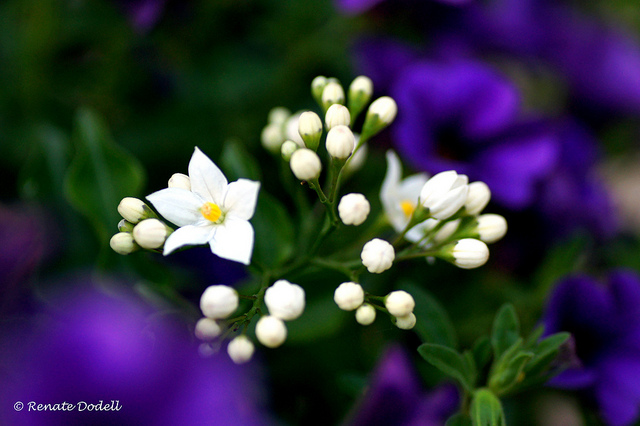Clothing and food — celebrated necessities — describe God’s abundant gifts to creation in an Isaiah passage that shows up twice in December’s lectionary: once on Advent’s third Sunday (December 14), where it concludes the reading, and once the Sunday after Christmas (December 28), where it leads off:
I will greatly rejoice in the Lord,
my whole being shall exult in my God;
for God has clothed me with the garments of salvation,
and has covered me with the robe of righteousness,
as a bridegroom decks himself with a garland,
and as a bride adorns herself with her jewels.
For as the earth brings forth its shoots,
and as a garden causes what is sown in it to spring up,
so the Lord God will cause righteousness and praise
to spring up before all the nations. (Isaiah 61:10-11)
Although verse 10 speaks of clothing and verse 11 of vegetation, parallels abound between these two related metaphors, both of which convey God’s bountiful, beautiful gifts. The abstract nouns dovetail: salvation and righteousness; righteousness and praise. And God’s activity in verse 10, adorning the speaker, and the earth’s corresponding work in verse 11, generating shoots from seed, register both as needs met and splendor overflowing.
The poet’s joy commences the description. This speaker is no passive witness. Earlier, in Isaiah 61:1 (December 14), the poet claimed that God “has sent me to bring good news to the oppressed, to bind up the brokenhearted.” Further on, in 62:1 (December 28), the poet declares, “For Zion’s sake I will not keep silent.” Here the speaker points out, announces, even trumpets God’s renewing work. The impetus is God’s; the poet cooperates, wholeheartedly.
Christians yearning for creation’s wholeness see much that invites despair today. We witness political resistance to environmental protection. We watch our beloved country, the world’s richest nation, refusing to enter climate agreements. We know the lengths to which some industries resort for gain without responsibility. We mourn the dwindling of animal populations, the endangerment of plant species, the rising risks to human health. We see storm surges, droughts, melts, mudslides, and other heralds of chaos. Even beauty reminds us of mortality, as the blazing splendor of an autumn tree foreshadows its imminent, premature death to invasive pests.
Hope is crucial if we are to participate, like this poet, in God’s renewing work. It’s different from optimism. Optimism believes that someone else will fix things, that we needn’t be bothered to act. Hope, in contrast, doesn’t leave solutions to others, but digs in and gets busy. Optimism is passive; hope is active. Diligence wastes little time in despair.
At the same time, hope’s momentum is not propelled for long by presumptions that all depends on us. Its energy comes, rather, from confidence that all depends on God, and that within the framework of God’s care, sharing in this saving work is our privilege. Hope “will not keep silent”; it proclaims “release to the captive.” In this month when grace is heaven-born but earthbound, arriving as a vulnerable child entrusted to an obscure, kindly couple, we too renew our humble participation in God’s aim to restore creation’s flourishing.
December 7
- Isaiah 40:1-11 envisions God’s coming in the earth’s wild places, the valleys and mountains, the rough places where human life is short, but divine words endure.
- Psalm 85:1-2, 8-13 sees faithfulness springing from the ground, righteousness peering down from the sky, and the land yielding its increase.
- 2 Peter 3:8-15a reminds us that God is not slow but patient, wishing that nothing should perish.
- Mark 1:1-8 announces John the baptizer from the wilderness, dressed in wild clothes, eating wild foods, baptizing with wild water.
December 14
- Isaiah 61:1-4, 8-11 describes “those who mourn in Zion” as “oaks of righteousness, the planting of the Lord.”
- Psalm 126 envisions the restoration of fortunes as waters in the wilderness and abundant grain harvests.
- Luke 1:46b-55 (see also Dec 21) celebrates divine reversals, lifting up the lowly and filling the hungry with food.
- 1 Thessalonians 5:16-24 exhorts the faithful to rejoice, pray gratefully, and never quench the spirit.
- John 1:6-8, 19-28 imagines Jesus’ coming as light, and John as the voice from the desert, witnessing to the light.
December 21
- 2 Samuel 7:1-11, 16 reminds King David that God was satisfied with tent-dwelling among God’s people.
- Psalm 89:1-4, 19-26 imagines divine faithfulness as enduring like the heavens.
- Romans 16:25-27 describes proclamation of Jesus as the mystery kept secret but now revealed.
- Luke 1:26-38 narrates God’s gift of fruitfulness to two unlikely women.
December 28
- Isaiah 61:10-62:3 imagines Jerusalem’s salvation as bright as the sunrise.
- Psalm 148 catalogues those called to praise God, prioritizing wild, heavenly forces and wild earthly inhabitants.
- Galatians 4:4-7 describes kinship with God.
- Luke 2:22-40 narrates Simeon’s readiness to “depart in peace,” having seen promise of redemption.

